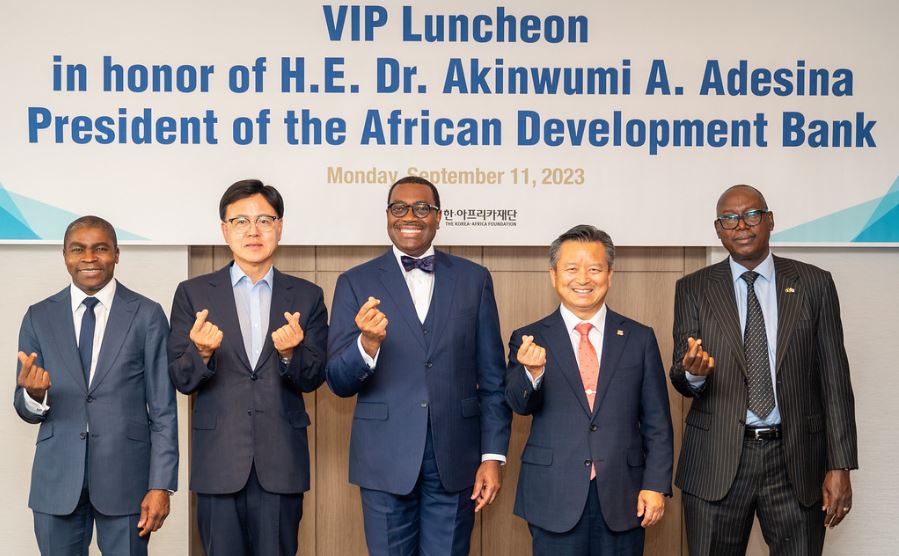The African Development Bank Group and the Government of South Korea are strengthening their partnership in a bid to accelerate progress towards food security and boost local vaccine and pharmaceutical production in Africa.
During a meeting with South Korea’s Minister of Agriculture, Food, and Rural Affairs Hwang-keun Chung in Seoul, African Development Bank Group President Dr. Akinwumi Adesina expressed confidence in Africa achieving food sufficiency within five years.
Read also: AFDB approves $70m in Morocco, $15.5m in Cabo Verde to boost foreign trade, tech
Empowering Agriculture through Collaborative Efforts
The African Development Bank, in collaboration with the AfricaRice research center, recently launched the $650 million Regional West Africa Rice Development (REWARD) program across 16 West African countries. This initiative aims to engage one million farmers in cultivating up to 750,000 hectares of land, producing 53 million metric tons of rice within five years.
Minister Chung highlighted South Korea’s K-Ricebelt initiative, working with eight African countries to produce 10,000 metric tons of rice, sufficient to feed 30 million people. Korea plans to invest up to $100 million in the project by 2027.
Adesina emphasised the need for synergy between REWARD and K-Ricebelt, envisioning Africa becoming self-sufficient in rice production within five years. He proposed merging these initiatives under the African Development Bank’s Technologies for African Agricultural Transformation (TAAT) platform, launched in 2018, to enhance agricultural productivity across Africa using proven technologies.
Ensuring Quality and Competitiveness
While increasing productivity to reduce food imports, Adesina stressed the importance of ensuring that locally produced rice meets the same quality standards as imports. Bridging the competitiveness gap through investments in rice processing infrastructure and proximity to milling plants is essential to reducing transportation costs and stabilising commodity prices.
Minister Chung expressed plans to involve more African countries in the K-Ricebelt initiative and invest in supporting infrastructure. He emphasised Korea’s advanced milling technology, which could potentially benefit African countries.
African Pharmaceutical Capability and Collaboration
Adesina discussed Africa’s efforts to enhance its pharmaceutical capability with Minister for Health and Welfare Kyoo Hong Cho. The African Development Bank’s president highlighted the importance of Africa manufacturing its vaccines and pharmaceuticals, particularly in response to lessons learned from the Covid-19 pandemic.
He called for South Korea’s support of the Africa Pharmaceutical Technology Foundation, established in 2022, to facilitate technology sharing and collaboration between the African pharmaceutical sector and global companies.
Minister Cho expressed support for strengthening pharmaceutical production in Africa, considering the continent’s unique needs and circumstances. Adesina mentioned the bank’s upcoming fellowship program, which would send African pharmaceutical scientists for training in advanced countries.
Learning from Korea’s Successes
Adesina and Minister Cho explored opportunities for African countries to learn from Korea’s national health insurance scheme, which provides coverage for all citizens based on income or assets.
Korea, a member of the African Development Bank since 1982, will host the 2024 Korea Africa Summit to foster long-term cooperative relations with Africa.
Adesina is leading the bank’s delegation at the 7th Korea-Africa Economic Cooperation (KOAFEC) Ministerial Conference, bringing together African finance ministers, pan-African institution heads, private sector leaders, government officials, and investors to discuss strategies for achieving food security and universal access to electricity in Africa.
African Development Bank (AfDB) partners with Africa Fintech Network on $525,000 grant
AfDB’s Contributions to Africa’s Development
African Development Bank has, over the years, approved funds meant for technological and infrastructural advancement in Africa across different sectors.
In December 2021, The Board of Directors of the African Development Bank approved a $170 million loan to finance a digital and creative enterprises program in Nigeria through the Federal Government’s investment in the Digital and Creative Enterprises (i-DICE) program.
In September 20202, the African Development Bank (AfDB) invested the sum of $20 Million Into an Off-Grid Recovery Platform following the aftermath of the coronavirus outbreak. The fund was used for the Clean Revolution Project (CRP), which is a blended finance initiative that aims to unlock private capital for energy-access companies. This was done to mitigate the pandemic’s adverse effects while advancing access to clean electricity and ensuring a green economic recovery.















